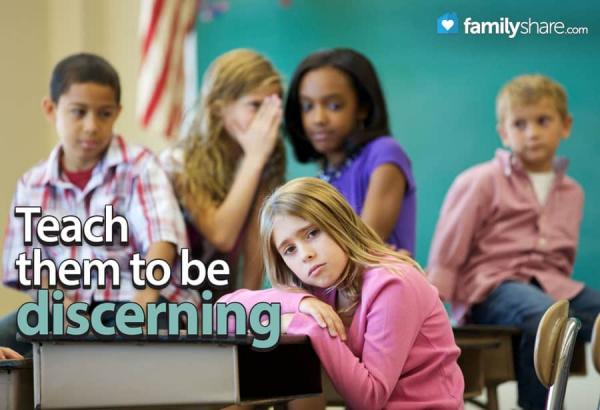
Your child brings home a new friend. You take one look and panic. The truth is that there are lessons here to be learned by both of you. Jumping the gun and cutting off the friendship can have disastrous results, such as alienation or defiance. Stop and consider a few vital points:
-
You may be misjudging the friend based on something superficial that scares you.
-
If you've told your children how smart and capable they are of making mature decisions, you can hardly strip them of that based on their exploration of a different sort of friend that you're used to.
-
There may be extenuating circumstances that made the friendship come about that you don't understand, such as bullying.
There are some better options to handling this uncomfortable situation:
-
Watch your child's behavior for drastic changes.
-
Ask them what it is that they likes about the new friend.*
-
Ask about the circumstances that made them friends.*
-
When your child has spent time with the friend, ask about what they did.
*It is important to not make this seem like a police interrogation, but asked in the same way you would ask, "How was your day at school?"
If your child does seem troubled, agitated, or restless after time spent with the friend, ask questions like these and then listen, without jumping in and sounding accusatory or judgmental:
-
"How did that make you feel?"
-
"What do you think made her behave that way?"
-
"Do you worry about him?"
-
"Does she have family support or other friends?"
-
"Is there anything that I can do to help you out?"
There are children, and I was one of them, who are constantly bringing home strays for a warm meal, friendly family time, and unconditional love. These children seem to be a magnet, and often even seek out, those who are in the fringes and may be misunderstood or bullied by other children. This is a wonderful quality, but not without its own unique dangers. Children must be cautioned from a young age to be discerning and even taught what sort of characteristics to look for that could be dangerous to them:
-
Friends who always seem to want something of theirs;
-
Friends who have had run-ins with the law;
-
Friends who are friends one day and not the next, fluctuating and leaving your child feeling anxious or sad;
-
Friends who look you in the eye and lie to you.
We've all had our share of hard-earned lessons when it comes to making new friends.
Points to remember:
-
Your child is never too young to talk to them about qualities they think a friend should have. Discuss different characteristics and explain the impact they can have on a relationship, using your own experiences, so that they know what to look out for and avoid.
-
Your child may have befriended someone they saw as having no friends, and there may be a reason for that, but time will tell you whether they really are trouble and you need to step in.
-
Be patient and use that barometer that all loving parents are given. Listen. Observe. Act if necessary.
-
Ask casual questions about the friend in the same manner you would about any activity or lesson or interest your child has.
-
Watch for drastic changes in your child's mood or behavior. Act if necessary, but do so in a loving and non-judgmental way.
-
If your child makes the decision to end the friendship, coach him through it, being supportive.
-
If it does end, try to avoid phrases like, "I was afraid of that." or "I knew it!"

